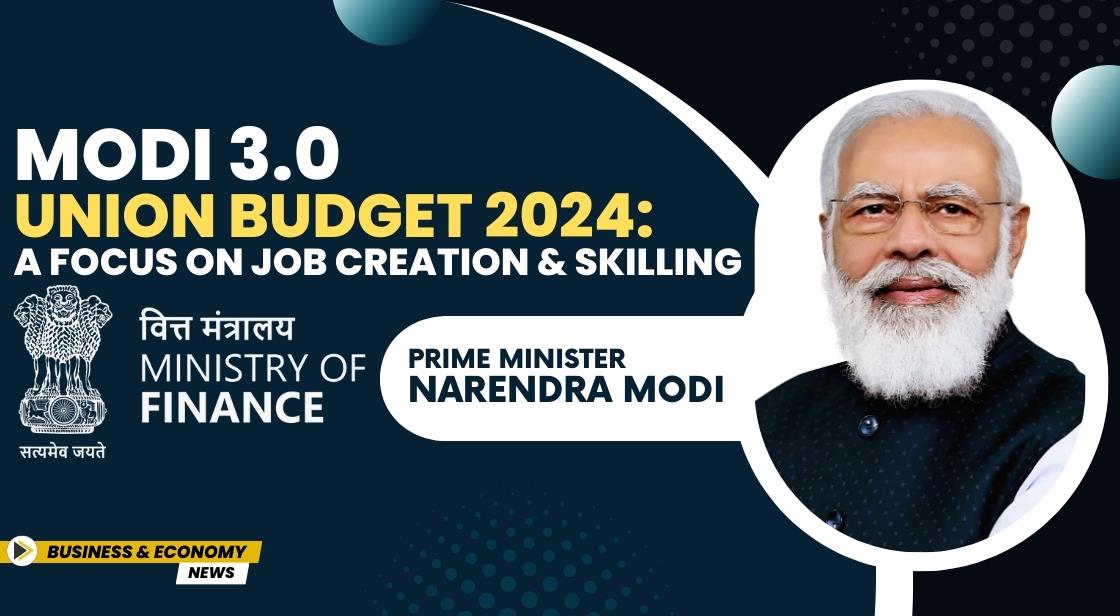Modi 3.0 Union Budget 2024: A Focus on Job Creation and Skilling

News Synopsis
With Finance Minister Nirmala Sitharaman set to present her first budget under Prime Minister Narendra Modi's third term on July 23rd, 2024, a key focus area is expected to be job creation and fostering a more dynamic job market.
Boosting Job Growth Through Targeted Initiatives
Experts anticipate several key initiatives aimed at addressing current job market challenges:
-
Labor-Intensive Manufacturing: Goldman Sachs expects the budget to prioritize labor-intensive manufacturing sectors, a move that could create a significant number of new employment opportunities.
-
Skilling and Reskilling Programs: The need for upskilling and reskilling the workforce has become paramount in the face of rapid technological advancements. The budget is likely to allocate increased funds to structured skilling programs that equip workers with the skills required for in-demand jobs. These programs could encompass areas like:
-
Vocational Training: Providing practical skills training programs can equip individuals for specific trades and occupations.
-
STEM Education: Enhancing Science, Technology, Engineering, and Mathematics (STEM) education can nurture a future-ready workforce proficient in critical technical skills.
-
Digital Upskilling Programs: Investing in digital upskilling programs can bridge the digital skills gap and prepare workers for the increasing demand for digital expertise across industries.
-
-
Tax Incentives for Training: The government might consider offering tax breaks for companies that invest in training and development programs for their employees. This can incentivize businesses to prioritize workforce development and continuous learning.
-
Modernized Labor Laws: Reforms aimed at streamlining labor laws are expected. The goal is to create a more flexible and adaptable HR landscape that caters to the demands of the evolving economic environment, while still protecting worker rights.
-
Encouraging Women's Participation: Initiatives aimed at increasing women's participation in the workforce are crucial for India's economic growth. The budget might incentivize measures like flexible work arrangements, parental leave policies, and childcare support programs to empower women to pursue careers.
Aligning Workforce Skills with Market Demands
Jasvinder Bedi, Managing Partner at Biz Staffing Comrade Pvt Ltd., emphasizes the critical role of the staffing industry in facilitating job creation and talent development. He calls for industry recognition and support for staffing companies to further enhance their contribution to economic growth.
Focus on bridging the skill gap is a central theme. By investing in skilling programs and fostering continuous learning, India can create a workforce equipped with the necessary skills to thrive in the job market of tomorrow.
Conclusion
The upcoming Indian budget under Prime Minister Modi's third term paints a promising picture for job creation and workforce development. With a focus on labor-intensive manufacturing, skilling initiatives, and modernized labor laws, the government aims to create a more dynamic and inclusive job market.
Investing in skilling programs across various domains like vocational training, STEM education, and digital upskilling is crucial to bridge the skill gap and prepare the workforce for future demands. Additionally, tax incentives for training programs can encourage businesses to prioritize employee development.
Modernized labor laws that balance flexibility with worker rights will foster a more adaptable HR landscape. Encouraging women's participation through supportive policies like flexible work arrangements and childcare support programs can further unlock India's economic potential.
By addressing these key areas and fostering collaboration between government, industry leaders like Jasvinder Bedi, and educational institutions, India can create a future-ready workforce equipped with the skills needed to thrive in the ever-evolving job market. This comprehensive approach has the potential to not only generate more jobs but also empower individuals and propel India's economic growth.
You May Like









